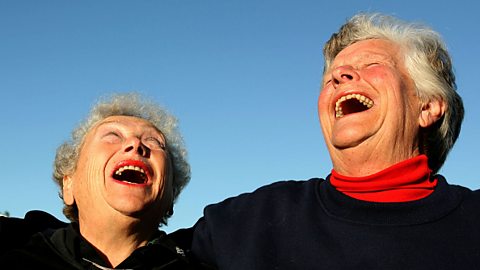Having a crush is hard enough at the best of times. You might blush constantly, be distracted 24 hours a day thinking about the precise fall of their fringe, and struggle to string even the simplest sentences together.
But it can be even worse when itÔÇÖs with the people you least expect. That person on your bus who pushed past you once and made you livid? Now you canÔÇÖt stop thinking about them.

Why is it that weÔÇÖre attracted to certain people, and what actually is it that makes them attractive to us? According to Dr Claire Hart, a psychology professor at the University of Southampton who teaches a module on the psychology of attraction, there are five main factors:
- proximity: how near you are to someone and how often you see them
- similarity: how like you they are, for example, do you share similar interests or values
- reciprocity: weÔÇÖre more likely to like people who like us
- physical attractiveness: are they pleasing to look at?
- familiarity: we like people who seem comfortable to us
This seems familiar
Most of these factors have in the past been attributed with how weÔÇÖve evolved as humans. Take familiarity, Dr Hart told Bitesize: ÔÇ£I think it links back to our evolutionary past. We are attracted to those who seem familiar to us, as familiarity provides predictability and safety.ÔÇØ
One such theory that links with familiarity is something called ÔÇÿimprintingÔÇÖ. Dr Alex Jones of the University of Swansea says it is slightly ÔÇ£out thereÔÇØ, and explained it with reference to the animal kingdom: ÔÇ£When animals are very young they have this thing called ÔÇÿsexual imprintingÔÇÖ which is where they use clues in their environment to figure out what a good mate might be, somebody who might be a good bet to try and reproduce with.
ÔÇ£ThatÔÇÖs usually based on characteristics that their parents have which, like I say, is a little bit weird.ÔÇØ
So for example, if someone in your family or group of friends that you grew up with was really funny, and you enjoy their company, you might be likely to be more attracted to funny people when you grow up, because itÔÇÖs something that youÔÇÖre used to.
These factors can also be linked. Like proximity and familiarity: if you see someone every day, youÔÇÖre likely going to get used to their company over time, until it gets to a point where youÔÇÖre very comfortable with them and it would feel strange not having them around.
But none of these factors are the be all and end all. ÔÇ£Just because youÔÇÖre near someone it doesnÔÇÖt mean youÔÇÖre going to like them, because if your first impression of them is bad, then being near them all the time isnÔÇÖt going to solve that,ÔÇØ explained Dr Hart.
DonÔÇÖt stand so close to me
Proximity has always been, and to some extent still is, considered the most important part of why weÔÇÖre attracted to someone, or even why weÔÇÖre friends with someone according to Dr Hart: ÔÇ£If you look at people who use Facebook for example you still find the people they would claim to be their best friends tend to be in close proximity to them. So I still think [proximity] has a major role to play, and itÔÇÖs by being close to people that you will realise that you share similarities with them or that you are physically attracted to them.ÔÇØ
Dating apps have gone some way to change this however. Where in the past you might have been limited to the people in your immediate circle or community to pick a date from, now you have hundreds upon thousands of more options.
She said technology has ÔÇ£changed the way that we interact with people and the number of people that we can potentially be attracted toÔÇØ, as now we can swipe through hundreds of potential partners every few minutes.
This can however be a bit of an issue: ÔÇ£When weÔÇÖve got more choice we donÔÇÖt actually know who weÔÇÖre attracted to because we would change the boundaries of who we actually find attractive.
ÔÇ£If you go into a supermarket and you see theyÔÇÖve got two jams youÔÇÖll say ÔÇÿokay I want that jamÔÇÖ, but if you go in and thereÔÇÖs this massive array of jams suddenly your criteria for what jam you want might change because thereÔÇÖs this massive selection and I think itÔÇÖs the same with dating.ÔÇØ

Or, as Dr Jones put it: ÔÇ£Having an infinite level of choice can be almost paralysing.ÔÇØ
So if weÔÇÖre constantly changing who we like, does this throw out the idea that we might have types?
Dr Hart seemed to think so: ÔÇ£I think weÔÇÖre less picky or our type isnÔÇÖt necessarily conformed to because you suddenly are bombarded with so much other information that you lose sight of your type.ÔÇØ
The long and short of it
Dr Jones said that whilst there are situations where it may seem as though we go for a certain type of person, this is subject to change as we go through life. This is to do with what he called our socio-sexual orientation: ÔÇ£It isnÔÇÖt to do with sexual orientation but is rather this tendency that people have to pursue sex without love, so whether theyÔÇÖre interested in short term or long term relationships.
ÔÇ£So if youÔÇÖre very open to sex without love, you tend to find certain types of faces more attractive and vice versa. But as people get older, things change in their life, their circumstances change, then this kind of proclivity also changes.ÔÇØ
ThereÔÇÖs a number of difficulties for this area of psychology however. In the case of physical attractiveness for example, previous studies have concluded that things such as symmetry and particular types of features are widely considered to be more attractive, because as weÔÇÖve evolved, weÔÇÖve figured they might indicate a certain level of reproductive health.
However recent research throws some of these assumptions out of the window. For example, studies in 2014 and 2018 found there was no link with facial asymmetry and poor health. Dr Jones said: ÔÇ£ItÔÇÖs an interesting time - we know some things but we actually know a lot less than we did about ten years ago.ÔÇØ
So, if you canÔÇÖt stop thinking about someone in your class, you feel ecstatic when youÔÇÖre near them and sad when you are away from them, be comforted by the knowledge that almost everyone will have been through it at some point, and there are people on the case to find out exactly why.
The Kem-istry of love: flirting
Want to know why your body goes haywire when you have a crush? Read this to find out.

What happens when we laugh?
The incredibly complicated process which enables us to giggle.

The psychology of stanning
What happens when we become obsessed with a celebrity?
